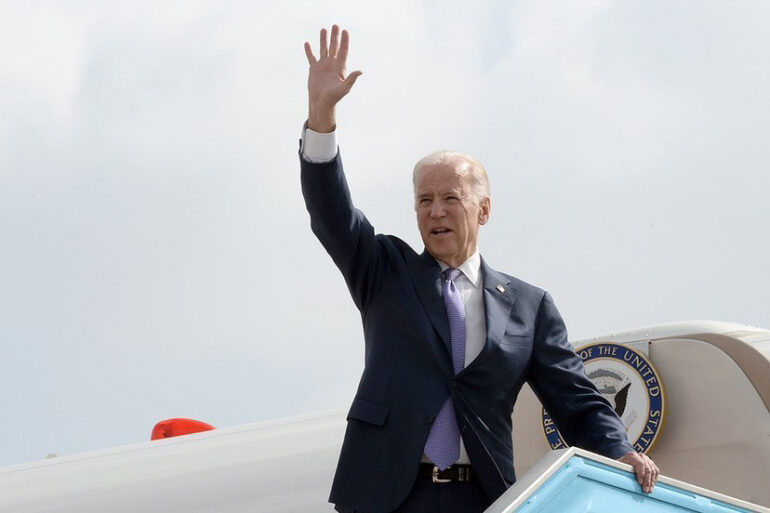United States President Joe Biden has finished his Israel and Saudi Arabia trip despite objections from inside his own party and previous campaign promises. The Biden Administration had been hinting at a significant breakthrough in Israeli-Saudi relations throughout the tour.
In the midst of the possible establishment of official peace between the Jewish state and the largest Arab state, it is important to recognize that peace in the region is coming not because of Washington, but in spite of Washington. American decline has united the Arab world together with Israel in opposition to Iranian aggression and in a common pursuit of the ascendance of Semitic civilization.
The path to Israeli-Arab unity against Iran is paved on the back of American decline. The malaise brought by the US wars in Afghanistan and Iraq combined with widely panned responses to Hurricane Katrina and the Great Recession has created a post-Bush consensus in the US; the American empire is spread too thin, losing credibility abroad with endless and mismanaged military engagements, unable to face threats from within.
President Barack Obama recognized this consensus and championed American soft power over hard power. This involved an American pivot to Iran, opening to the growing regional power, easing economic regulations, providing a path to nuclear development, sending foreign aid, and otherwise extending the olive branch for peace and cooperation. This is similar to how President Dwight D. Eisenhower treated a rising Egypt after its 1952 Revolution; offering to fund the Aswan Dam and forcing a British, French, and Israeli retreat in the 1956 Suez Campaign, all for the sake of winning a powerful, ascendant ally in the Middle East.
These policies are products of both a preference for soft power and neorealism, the foreign policy philosophy that argues states are driven primarily by a will to survive in an anarchic world, therefore, acting in rational self-interest to maximize power, security, and prosperity. Neorealism runs contrary to constructivism, the philosophy that argues that self-identity precedes rational self-interest when understanding and predicting the actions of nation-states.
Constructivism, rather than neorealism, was championed by the Trump Administration in regard to Iran. Trump argued that the Iranian regime was founded on expansionist aspirations that fundamentally oppose American survival. I’m Trump’s view, no amount of money, regulatory-easing, or kind gestures will strip Iran of its aspirations or animosity, instead it would only help them in their goals. Nevertheless, Trump shared in the post-Bush consensus and would not participate in a foreign conflict against Iran or support action from allies that could spark such a war.
Israel and its Sunni neighbors face the most immediate threat to Iranian imperialism, many of which are already under constant attack from Iranian proxies. These states have concluded in the past decade that the US is an unreliable leader in containing and combatting Iranian interests. At best, they will maintain neutrality and at worst they will actively advance Tehran’s agenda. Much of the Abrahamic Accords are built on this premise, without the leadership of the US it is incumbent on the nations of the region themselves to create a united front to protect their sovereignty against Iran.
Unity against the threat of Iran only tells one part of the story, however. Beyond collective action against shared threats, Israel and its budding Arab allies share a common pursuit of the advancement of Semitic civilization. Semitic civilization is the society formed by the children of Shem and developed under the influence of Abraham through the vehicles of Hebrew and Islamic political power. Semitic civilization is fundamentally at odds with the West, morally and politically; the West is dualistic, materialistic, individualistic, and hedonistic while Semitic civilization is collectivistic.
Each seeks the moral and political reigns of the global stage.
Israel’s place in this clash of civilizations is not to be a “villa in the jungle” as Prime Minister Ehud Barak once said, a Western vassal in a far-off region, but to be authentic to ourselves and our purpose, an authentic part and ultimately a leader of an emerging Semitic civilization. Just as “Isaac and Ishmael buried him [i.e.: Abraham]” (B’reshit 25:9), a shared Semitic civilization can lead the world to peace and justice through the legacy of Abraham.
Can President Biden’s recognition of this cultural conflict be his true motive for declaring Saudi Arabia a “pariah” during the 2020 campaign? Biden may dress his threat of isolating and starting the Arabian kingdom up as sincere moral concern (rich coming from the US), but in reality, it is a reaction to Crown Prince Mohammed bin Salman’s ongoing transformation of Saudi Arabia into a global powerhouse capable of challenging the current American-led world order. Not only is Prince Mohammed challenging US global political hegemony, but he is also implicitly challenging the moral hegemony of the entire West.
Biden’s hawkish stance, however, has since been made impossible by the US oil crisis. Just two years after his campaign, Biden has found himself at the feet of the Saudi crown, begging for oil.
Biden feels the same begrudging commitment to Israel. When talking about US-Israel relations, Biden often says, “if Israel didn’t exist, the US would have to invent one to protect US interests.” Biden is extremely open that the US-Israel allyship exists not for any moral or principled reason, but only as long as Israel serves US foreign policy objectives. In the past, this has specifically meant Israel’s surrender of its foreign policy independence to the US in exchange for American loans, vouchers, and military technology.
Semitic civilization’s relationship with the West has entered a new era with the current energy crisis. Biden is unable to execute his previous policy objectives with Saudi Arabia because of the US dependence on Saudi oil. Likewise, the emergence of European dependence on Israeli natural gas can provide Israel with a path towards political independence from the West without risking its allyship, growing from a vassal to an equal. In the past, when Israel even slightly departed from American dictation on foreign policy, it lost Western support and suffered due consequences. In this new Semitic-Western dynamic, Israel can independently exercise its sovereignty in policy-making, breaking its dependence on the West for subordinate policy cooperation, while keeping the West dependent on its natural gas. Israel will soon be able to maintain its allyship while also conducting independent policy.
With this combination of policy independence and dependence-guaranteed Western allyship, Saudi Arabia is free to continue with its internal advancement program. In this program, Prince Mohammed is seeking to assume control of two Red Sea islands occupied by Egypt, signed over to them by Israel at Camp David. However, Egypt and Saudi Arabia require Israeli approval for the complete transfer of these islands, per the provisions of the Camp David Accords. Along with a mutual opposition to Iran, the common will to advance and develop Semitic civilization is a driving force behind the budding Israeli-Saudi peace.
Peace on these grounds is hugely important to Israel both internally and externally. Semitism, the political philosophy pioneered by Leḥi (Fighters for the Freedom of Israel) political leader Natan Yellin-Mor, recognized Israel’s political and cultural affiliation to the West over its Semitic neighbors as the foremost obstacle to peace and, ultimately, Israel’s liberation. Semitic consciousness and unity among Semitic peoples and states are necessary to provide mutual protection of sovereign independence from imperialism and necessary to wean Israel off of the United States. Bonding the largest Arab kingdom and the Jewish state together under the common goal of resisting Iran and the West, and developing Semitic civilization is a giant step towards these ends.
In short, Israeli-Arab relations are blossoming as a reaction to American imperialism; it’s warming to Iran, its interference in the political affairs of other nations, and its hegemonic political and moral control of the globe. US political leaders may campaign on the Abrahamic peace process, but it is a peace process that exists in spite of them, not because of them.





